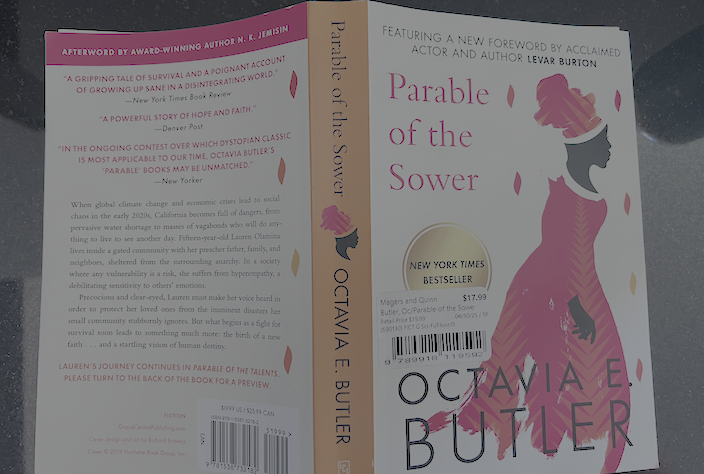I read this book for the Elle Cordova SF book club; it is number 3 in the sequence. I was familiar with some of Butler’s earlier work, the Xenogenesis stories, which I liked, and at some point had read Parable of the Sower, which I did not care for.
To step back a moment: Octavia Butler is justly lauded for her impact on late 20th century and later science fiction. Though by no means the first black author to make a name in the genre (Samual Delany is, I think, the progenitor), she is among the first to really foreground themes related to black experience — characters experiencing racism, dominance/repression, resistance/survival, and (loss of) bodily autonomy. As I write this, I balk, because I am by no means a scholar of SF, and so I should preface the foregoing with “In my limited experience.”
In re-reading ‘Sower,’ I found myself recapitulating my initial unfavorable reactions. The first being, ‘I don’t think this is really science fiction.’ [Clearly SF writers disagreed with me, as this novel was awarded a Nebula.] Still, it seems like a straight-forward post-apocalyptic novel — I was going to write, “in the vein of Cormac McCartney’s The Road — but on pausing to look it up, I find that this pre-dates Road by at least a decades. I didn’t care for The Road, either, so at least I am consistent here. In both cases, we don’t have much in the way of science happening, just an extrapolation of current trends that are leading / have lead to the breakdown to the climate, environment and society, and protagonists living off scavenged food amid a world filled with violent and destructive bands. Sower does give its protagonist, an odd disability/delusion called hyperempathy caused by a mother’s use of a drug during pregnancy, but, although complicating life for the protagonist, this problem does not seem to me to fundamentally shape the story.
My second unfavorable reaction has to do with the unrelentingly-grim world of the book. The closest the book gets to hopefulness are a few periods of stability in the midst of a long inevitable decline, which the protagonist tries, inadequately, to prepare for. Of course, this is perhaps a realistic portrayal of the challenges we face, but it does not make it a fun read (except, perhaps, in contrast to its sequel Parable of the Talents, which I am now finishing and will probably not write about).
I suppose that the best that may be said of the book is that it shows the kindness and inclusiveness is at least a middle-term effective strategy, and that people can overcome interpersonal obstacles to work together. It also posits an interesting believe system — being constructed by the principal protagonist — that, it is argued, is more suited to the needs of the post-apocalyptic world, and paints a realistic picture of the ways in which it evolves and spreads.
The book is thoughtful and well-written, but I’m still not convinced that it should be called science fiction…
# # #
Views: 0
